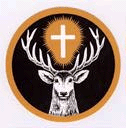
Eustace Families Association

Before The Chilterns
By: Donald W. Eustace
There were no personal records beforethe end of the 16th century. The parish records of baptism,marriage and burial were made law in the early part but notenforced until the end of the century, Before this the student ofhistory is dependent on deeds, court records, wills and the liketo give circumstantial rather than direct evidence. This meansthat there are gaps to be filled by deduction and, maybe,speculation. For ease of reading the story is told here as a.straight narrative but for the historically minded and thesceptical the sources, deductions and arguments are given in thenotes at the end of the chapter. It is hoped that these will bean inspiration and a challenge to a later generation to continuethe research so as to confirm or correct the account.
Once upon a,time there was a beautiful princess, well she wasa princess without a doubt as she the daughter of King Ethelredof England who is to say she wasn't beautiful? She was born about1003, baptised Godgifu or Goda and married Drogo of Mantes, Countof the Vexin in France. She had two sons of whom the younger,Ralph was brought up by her brother, King Edward the Confessor.It is possible that Ralph was considered a possible heir toEdward but he was not successful as earl of Hereford, gaining thesomewhat uncomplimentary nick-name of Ralph the Timid andhe completely disappeared from the scene.
In the meantime Drogo had died and the widowed Goda hadmarried Eustace, Count of Boulogne. This Eustace was grandson ofBaldwin, Duke of Flanders and on the female side descended fromboth Charlemagne and Alfred the Great. The marriage took placebetween 1035 and 1038 and there is no record of any sons. It isthought however that there may have been a daughter who marriedaround 1051 and had a son. Goda died and Eustace married a secondtime to Ida of Bouillon by whom he had three sons, two of whombecame famous later as crusader kings of Jerusalem. A grandsonborn about 1052 would have been too young to accompany Eustace onthe Invasion in 1066, in which he was chief ally of William ofNormandy and reputed to be one of the group of four Normans thatactually killed King Harold . The grandson does appear, however,to have accompanied Eustace the following year, 1067, when hetook the opportunity while William was busy in Normandy to attackDover, to relieve the people of Kent from the oppression ofBishop Odo, earl of Kent. The attack was abortive and thegrandson was captured.
And so, in the Domesday record we find Geoffrey, son orgrandson of Eustace of Boulogne as lord of the manor of Aulton(Carshalton south London) which was the dowry of his wife,daughter of Geoffrey de Mandeville, constable of the Tower ofLondon. This Geoffrey can reasonabl.y be considered, the firstEnglish member of the family as he had made this country hishome. He held other manors at Lambourne, Magdalen Laver and BlakeHall in Essex, Beauchamp Layston in Hertfordshire, all of whichcame from the Boulogne estates.
Geoffrey and his de Mandeville bride had a son William, who inturn had three sons. Paramus, the eldest, was a soldier whosuccessfully held Dover for King Stephen in the civil war thatcontinued throughout this reign. He was granted the manor ofWendover and Eaton Bray in Buckinghamshire for services to HenryII. These together with the other manors he left to his daughterSybil, who married Ingelram le Fiennes and the property passed tothat family.
The second son, Eustace, was a lawyer and as such became asenior member Of the staff of Theobald, Archbishop of Canterbury.The archbishop lived mainly in Harrow but when in London helodged with a boyhood friend Gilbert Beckett who had become aport-reeve (predecessors to the mayors) of London. Thearchbishop's associates did the same and so it was that MasterEustace and his relative, Archdeacon Baldwin of Boulogne met theson Thomas and recognising his ability introduced him to thearchbishop. This young man was to become Chancellor of England,Archbishop of Canterbury and Saint Thomas a Beckett.
Master Eustace married the young heiress Hawise of Bocland,daughter and grand-daughter of sheriffs of Berkshire andsurrounding counties. They had three sons, William, Eustace andGeoffrey. Hawise married a second time to William de Lanvaly andshe outlived not only her two husbands but her eldest son aswell.
William was at one time sheriff of Cornwall. He married Maudde Say, grand-daughter of Geoffrey of Mandeville, Earl of Essexand they had three daughters among whom the various manors wereeventually shared. These manors came from three families, the deBoclands, the de Lanvalys and those acquired by William such asCippenham, Bucks.